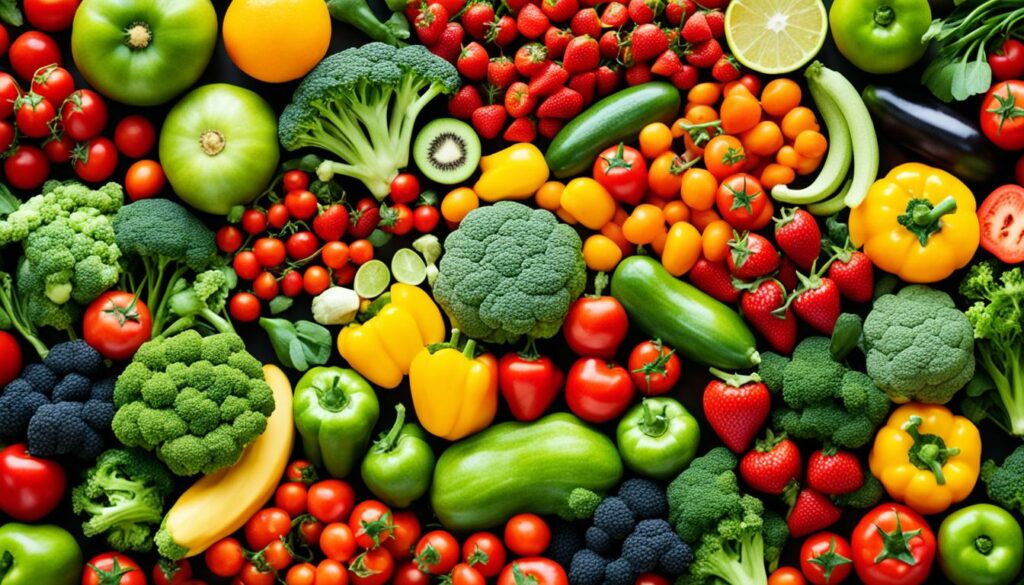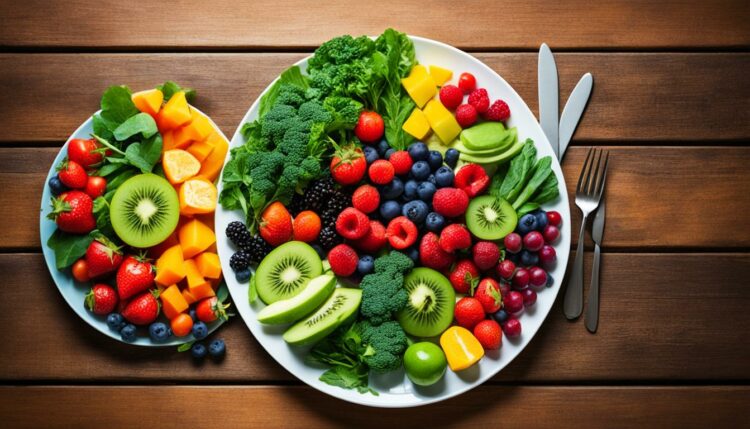Dopamine is a neurotransmitter in the brain that plays a key role in many body functions like motivation, mood, focus, attention, memory, and motor control. Certain foods can boost dopamine levels in the body.
Dopamine is also known as the “feel-good” hormone that creates a sense of happiness and pleasure. Low levels of dopamine or excess dopamine in the body are associated with various diseases. Increasing dopamine levels naturally can be achieved through diet and other lifestyle factors.
Key Takeaways:
- Dopamine is a neurotransmitter that affects various body functions and emotions.
- Certain foods can boost dopamine levels in the body.
- Dopamine is also known as the “feel-good” hormone.
- Low or excessive levels of dopamine are associated with various diseases.
- Increasing dopamine levels naturally can be achieved through diet and lifestyle changes.
What is Dopamine and How Does It Work?
Dopamine is a chemical messenger and neurotransmitter in the brain that acts as a signaling system between nerve cells. It is vital for various body functions, including movement, mood, attention, memory, learning, behavior, sleep, and arousal.
Dopamine plays a key role in the brain’s reward and pleasure centers, being responsible for feelings of happiness and pleasure. When dopamine levels are normal, a person feels happy, motivated, focused, and alert.
Additionally, dopamine release is involved in various physiological processes. However, imbalances in dopamine levels can lead to the development of certain diseases. Hormones significantly influence a man’s sexual activities. Testosterone, dopamine and prolactin, in particular, are crucial. These hormones collaborate to regulate sex drive.
Too little dopamine can cause feelings of unhappiness, fatigue, and lack of motivation, while excessive dopamine can result in hyperactivity and aggressive behaviors.
Low levels of dopamine or excess dopamine have been linked to conditions like restless legs syndrome, attention deficit hyperactivity disorder (ADHD), and Parkinson’s disease.
The precise mechanisms by which dopamine works are complex and interconnected. Dopamine production and regulation involve various pathways and structures in the brain, including the basal ganglia and the prefrontal cortex.
As a neurotransmitter, dopamine acts by binding to specific receptors on nerve cells, transmitting signals and facilitating communication between different areas of the brain. This communication plays a vital role in coordinating body movements, influencing emotional states, and regulating cognitive processes.
Overall, dopamine is an essential component of our wellbeing, impacting our mood, motivation, attention, and overall quality of life.
The Role of Dopamine in Body Functions
Dopamine is involved in a wide range of body functions, including:
- Movement: Dopamine helps control coordination, smoothness, and precision of movements.
- Mood: Dopamine influences emotional responses and the overall experience of pleasure and happiness.
- Attention: Dopamine plays a role in maintaining focus and concentration.
- Memory: Dopamine aids in the formation and retrieval of memories.
- Learning: Dopamine supports the process of acquiring new knowledge and skills.
- Behavior: Dopamine affects decision-making, risk-taking, and reward-seeking behavior.
- Sleep: Dopamine regulates the sleep-wake cycle and promotes wakefulness.
- Arousal: Dopamine contributes to the desire for sexual activity, erection and ejaculation.
In conclusion, dopamine is a vital neurotransmitter that mediates numerous body functions and influences our mental and physical well-being.
Foods That Boost Dopamine Levels
The dopamine-boosting diet includes foods that are high in tyrosine, an amino acid that is a raw material required for dopamine production. Incorporating these dopamine-boosting foods into your diet can help increase dopamine levels naturally.
| Foods | Benefits |
|---|---|
| Nuts and Seeds | Almonds, walnuts, pumpkin seeds, flaxseeds |
| Lean Protein | Eggs, chicken, salmon, mackerel |
| Fruits and Vegetables | Apples, bananas, oranges, watermelon, strawberries, avocados, beets, tomatoes, green leafy vegetables |
| Milk and Dairy Products | Milk, cheese, yogurt |
| Dark Chocolate | Contains phenylethylamine, which stimulates dopamine release |
| Green Tea | Contains L-theanine, which promotes dopamine production |
| Oatmeal | Rich in complex carbohydrates that support dopamine production |
| Wheat Germ | High in vitamin B6 and folate, which are important for dopamine synthesis |
| Turmeric | Contains curcumin, which has been found to increase dopamine levels |
These foods are not only delicious but also contain essential nutrients like tyrosine and magnesium that can help increase dopamine levels naturally. However, it is important to note that more research is needed to fully understand the effect of diet on dopamine levels.

Other Ways to Increase Dopamine Naturally
In addition to incorporating dopamine-boosting foods into your diet, there are several lifestyle factors that can help naturally increase dopamine levels. By making simple changes to your daily routine, you can promote optimal dopamine production and enhance your overall well-being.
Regular Sleep: Getting enough quality sleep is essential for maintaining healthy dopamine levels. Aim for 7-9 hours of sleep each night to support optimal brain function and dopamine release.
Sun Exposure: Spending time outdoors and soaking up some sunlight can stimulate dopamine production. Aim for at least 15-30 minutes of sun exposure daily, especially in the morning.
Exercise: Engaging in regular physical activity has been shown to boost dopamine release. Incorporate activities you enjoy, such as walking, jogging, dancing, or cycling, into your daily routine.
Spending Time with Loved Ones: Social interactions and bonding with loved ones can increase dopamine levels. Make time for meaningful connections and enjoy activities together.
Playing With a Pet: Interacting with pets has been found to increase dopamine levels and promote feelings of happiness and well-being. If you have a furry friend, take some time each day to play and bond.
“Listening to music, achieving a meditative state, practicing yoga, and engaging in enjoyable activities can increase dopamine levels.”
Reading a Book: Reading is a great way to engage your brain and boost dopamine release. Choose books that interest you and spend some time each day diving into a good story or learning something new.
Listening to Music: Listening to your favorite music can evoke emotions and stimulate dopamine production. Create playlists of songs that make you feel happy and energized.
Achieving a Meditative State: Activities such as meditation, deep breathing exercises, or mindfulness practices can help calm the mind, reduce stress, and promote dopamine release.
Practicing Yoga: Yoga combines physical movement, deep breathing, and mental focus, making it an excellent way to enhance dopamine production and promote mental well-being.
Engaging in Enjoyable Activities: Participating in leisure activities that bring you joy and fulfillment can also increase dopamine levels. Whether it’s painting, dancing, gardening, or playing a musical instrument, make time for activities that make you feel alive and passionate.

Cold Water Therapy: Cold showers or cryotherapy have been found to significantly boost dopamine levels. Consider incorporating cold water therapy into your routine, but consult with a healthcare professional if you have any underlying medical conditions.
Supplementation: In some cases, supplementation with specific nutrients may be beneficial for increasing dopamine levels. Consider consulting with a healthcare provider to determine if supplementation with tyrosine, omega-3 fatty acids, magnesium, L-theanine, or vitamins D, B5, and B6 is right for you.
Dopamine-Boosting Lifestyle Factors
| Lifestyle Factors | Description |
|---|---|
| Regular Sleep | Getting enough quality sleep supports optimal dopamine production. |
| Sun Exposure | Spending time in the sunlight stimulates dopamine release. |
| Exercise | Engaging in physical activity boosts dopamine levels. |
| Spending Time with Loved Ones | Meaningful social interactions increase dopamine production. |
| Playing With a Pet | Interacting with pets raises dopamine levels and promotes well-being. |
| Reading a Book | Reading stimulates dopamine release and enhances brain function. |
| Listening to Music | Listening to music evokes emotions and stimulates dopamine production. |
| Achieving a Meditative State | Meditation and mindfulness practices calm the mind and promote dopamine release. |
| Practicing Yoga | Yoga enhances dopamine production and promotes mental well-being. |
| Engaging in Enjoyable Activities | Participating in activities that bring joy and fulfillment boosts dopamine levels. |
| Cold Water Therapy | Cold showers or cryotherapy significantly increase dopamine levels. |
| Supplementation | Supplementing with specific nutrients may support healthy dopamine levels. |
Conclusion
In conclusion, dopamine is an essential neurotransmitter that plays a vital role in our overall well-being. By incorporating dopamine-boosting foods into your diet and adopting healthy lifestyle habits, you can naturally increase dopamine levels and promote a healthier, happier you.
It is important to note that while diet and lifestyle changes can support dopamine production, it is always wise to consult with a healthcare provider before making any significant changes to your routine. They can provide personalized guidance and ensure that any modifications align with your individual needs and health goals.
So, whether it’s enjoying a nutritious meal rich in tyrosine, engaging in regular exercise, or practicing self-care activities that bring you joy, taking steps to boost dopamine levels naturally can have a positive impact on your overall well-being. Prioritize your health and start incorporating these natural ways to increase dopamine levels into your daily routine.
FAQ
What is dopamine and how does it work?
Dopamine is a neurotransmitter in the brain that acts as a signaling system between nerve cells. It plays a key role in various body functions like movement, mood, attention, memory, learning, sleep, arousal, and behavior. Dopamine release is involved in physiological processes, and it is responsible for feelings of happiness and pleasure.
What are foods that boost dopamine levels?
Foods that can increase dopamine levels include nuts and seeds (such as almonds, walnuts, pumpkin seeds, and flaxseeds), lean protein sources like eggs, chicken, and fish (such as salmon and mackerel), fruits and vegetables (including apples, bananas, oranges, watermelon, strawberries, avocados, beets, tomatoes, and green leafy vegetables), milk and dairy products, dark chocolate, green tea, oatmeal, wheat germ, and turmeric.
How can I increase dopamine naturally?
In addition to consuming dopamine-boosting foods, you can increase dopamine levels naturally by getting regular sleep, sun exposure, and exercise.
Spending time with loved ones, playing with a pet, reading a book, listening to music, achieving a meditative state, practicing yoga, and engaging in enjoyable activities can also help boost dopamine levels.
Cold water therapy, like cold showers or cryotherapy, has been found to significantly increase dopamine levels. Additionally, supplementation with nutrients like tyrosine, omega-3 fatty acids, magnesium, L-theanine, and vitamins D, B5, and B6 can support healthy dopamine levels.
Can dopamine levels be increased through diet alone?
While diet plays a significant role in dopamine production, it is important to note that more research is needed to fully understand the effect of diet on dopamine levels.
Incorporating dopamine-boosting foods into your diet is a natural way to support dopamine production, but it is also essential to consider other lifestyle factors, such as sleep, exercise, and stress management, for optimal dopamine levels.
How can I seek professional advice on increasing dopamine levels?
If you are interested in increasing dopamine levels or have concerns about your dopamine function, it is recommended to consult with a healthcare provider or a registered dietitian who can provide personalized guidance based on your specific needs and medical history.
They can help you develop a comprehensive plan that includes diet, exercise, and other lifestyle modifications to optimize your dopamine levels and overall well-being.




